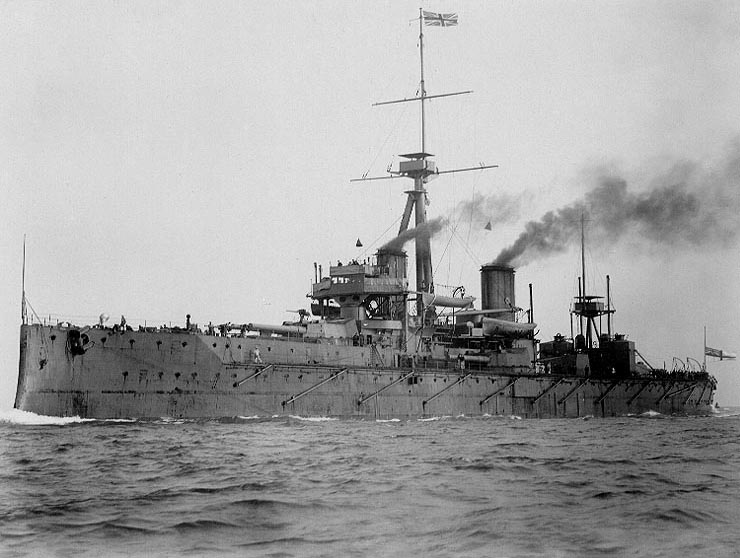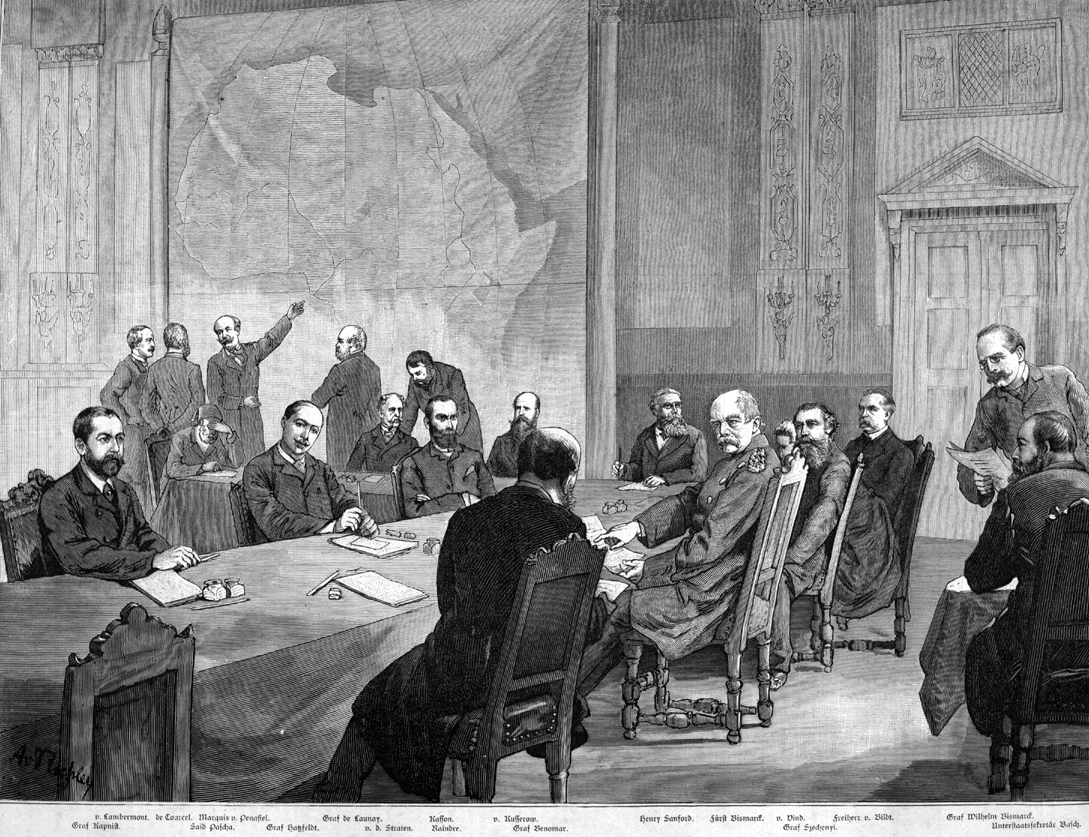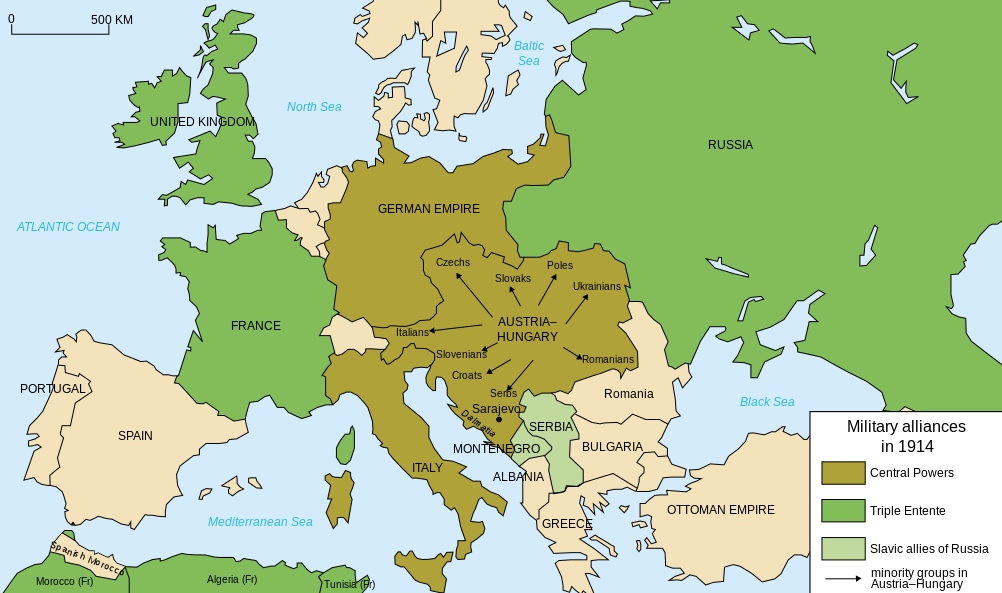
Throughout most of the 19th century, Anglo-Prussian relations have been marked with cooperation and meaningful interactions. The countries often allied in wartime and their respective royal families intermarried (the King of Britain and the Kaiser of Germany were in fact related – cousins). However, this situation changed after the unification of Germany in 1871, as it presented a new, perplexing state of affairs. Since then, these relations deteriorated due to Germany’s emergence as a European strongest industrial power, its active participation in the colonial race, ensuing naval arms’ race, alliances and decisions made in the July Crisis of 1914. This growing antagonism would eventually lead to the First World War.
The new-formed Germany became not only a country not to be trifled with but an economic strength and in that aspect, a challenger to the already leading powerhouse, America. The emergence of a potential rival on the continent prompted much concern and re-focused British suspicion and paranoia. Out of all the major powers, Britain was most determined to stop another napoleonic-like hegemony from occurring and the strongly nationalistic, militarized and rapidly-developing Germany was; therefore, a threat. Nevertheless, the British did not wholly disapprove of Napoleon III’s defeat by the Germans and his political status degradation; in fact they were well pleased with such a course of things.
Furthermore, it was in the intention of Germany’s Chancellor – Otto Von Bismarck – not to provide the British with any points of displeasure or incentives that might aggravate them. He recognized very well the significance of keeping up good terms and more importantly, of preserving the British in splendid isolation, and proceeded accordingly with that concept in mind. In fact, Bismarck repeatedly expressed the desire to cooperate with Britain via British Ambassador Odo Russell; in maintaining the status quo in Turkey and in the general preservation of peace in Europe. The British government was less convinced about the credibility of the Chancellor’s intentions than Russell, and suspected he wanted to embroil Britain and France in the Middle East. This was for the most part true, as a key idea to Bismarck’s politics was the establishing a web of diplomatic relations between the major powers, that would be favourable for the Germans.
Given that an imperialistic dogfight was already ongoing, Bismarck was wary of entering the race for overseas colonies and preferred to reserve the role of Germany as an honest broker in continental affairs. However, due to high public demand, Bismarck was forced to take such action – albeit he did so unwillingly. Meaning to resolve the matter (“The Scramble of Africa”) and discuss the division of spoils, he convened the Berlin Congress of 1884-85.

The Congress stimulated imperialistic ambitions but also established rules for the recognition of European claims in Africa, in that they were to be performed legally and in consensus with the other major powers. Britain found this to be more than satisfactory; they obtained for the most part what they wanted, this being European recognition of their claim in Egypt and the internationalization of Congo – both of which were diplomatic successes over the French. In addition, Germany’s role in hosting the international conference and their appearance as peacekeepers assuaged British apprehension towards them and conferred positive prestige to the former. Though the situation at the time was handled well – regrettably, this would be a later source of accelerating friction and strains.
The coming of Kaiser Wilhelm II to power in 1888 ruined the fragile balance of interests and diplomatic ties that Bismarck had crafted. The Chancellor was dismissed by the Kaiser, who then set out to taking direct control of the government and of fulfilling his overriding ambitions: of building an overseas colonial empire and a naval power that would be capable of competing with that of Britain. These aspirations, his policy of Weltpolitik (of aggressive expansion and diplomacy), along with the Kaiser’s outrageous conduct, caused a definite breakdown in Anglo-German relations. He championed five successive naval laws (1898-1912), and openly claimed that Gemany’s “future lies on the sea” – an obvious and increasing threat to Britain’s dominant naval power and safety of the country. Moreover, a simultaneous event – this being the wars with the Boer republics of South Africa (1880-81/1899-1902) – exposed Britain’s weakness and inability to control portions of its African empire (despite victory), and prompted the sending of the Kruger Telegram (the Kaiser’s congratulations to the president of the Transvaal Republic on the repelling of the British). This led to a further inflammation of tensions between Germany and Britain, but also reinforced the latter in the belief that reforms were necessary. From thereafter, they began seeking out allies and improving world relations (the 1902 treaty with the Empire of Japan being a key moment).

Anglo-German tensions were simmering during the beginning of the 20th century. The formation of alliances (Central Powers, Triple Entente) further added to the division. At the time, Germany made attempts at rupturing the Triple Entente, principally by engineering crises in Morocco (1905/1911). Their aim was to test the strength of the relationship between France and Britain, and to exploit said weakness for their own gain; possibly, by intimidating Britain into an alliance. However, these efforts had the reverse effect; it resulted in the strengthening of the Anglo-French Entente Cordiale (Britain backed up their allies both times) and added to British hostility and Anglo-German estrangement. These relations remained largely unchanged for a couple of years – the diplomatic field having moved to the Balkans – but fired up again during the developments after 1913. Allegiances and agreements took their toll in the July Crisis of 1914, but Britain remained neutral until the implementation of the Schlieffen Plan by the Germans. Bound by the treaty of London (1839), the British broke off diplomatic relations with Germany and issued an ultimatum requiring that it withdraw its troops from Belgium by midnight the same day. The request was refused, thus Britain joined the war.
British foreign policy towards Germany shifted throughout the years, and was characterized by an increasing deterioration in relations. Germany’s unification marked the moment in which these relations took a turn for worse, as it acted on Britain’s deep-rooted paranoia and sense of insecurity; its participation in the colonial and naval arms’ races came off as a threat and inspired Britain to reject their policy of splendid isolation; and the formation of alliances solidified the bonds as they would be in World War One.
Adela Kapuścińska
IB essay in history.